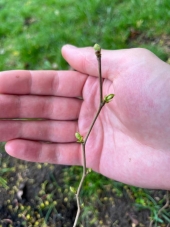

My PEP Badge Tracker: An easier way to track your PEP Badge Progress
will be released to subscribers in:
soon!






 4
4




"When the whole world is running towards a cliff, he who is running in the opposite direction appears to have lost his mind." C.S. Lewis
Visit https://themaineingredient.com for organic, premium dried culinary herbs that are grown, processed, and packaged in the USA.
 4
4





 7
7





How Permies works: https://permies.com/wiki/34193/permies-works-links-threads
My projects on Skye: The tree field, Growing and landracing, perennial polycultures, "Don't dream it - be it! "
 4
4




 4
4




Nancy Reading wrote:Sometimes the best answer is to do nothing.....
I suggest that you wait and observe. Watch for wasps and ladybird larvae to come and hoover them up - that'll boost the predator population and reduce the aphid burden next year.
If you have space, plant flowering plants like fennel and daisies to attract more beneficial insects like hoverflies. Their larvae also are great for aphid control and are also good pollinators for many flowers (so you get a better fruit crop too!)
"The best fertilizer is the gardener's shadow"
Anonymous Agrarian Blog
 2
2




Zone 6, 45 inches precipitation, hard clay soil




 2
2




Country oriented nerd with primary interests in alternate energy in particular solar. Dabble in gardening, trees, cob, soil building and a host of others.
 1
1




Wildsong Gaian Sanctuary
Regenerative food forest & Nature-focused retreat center in Bethel, NY
www.wildsong.earth



